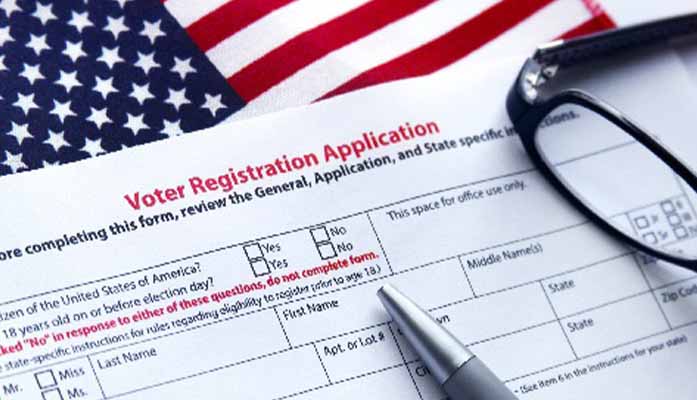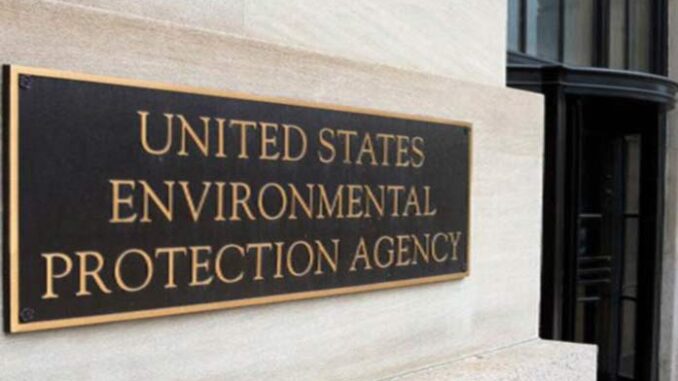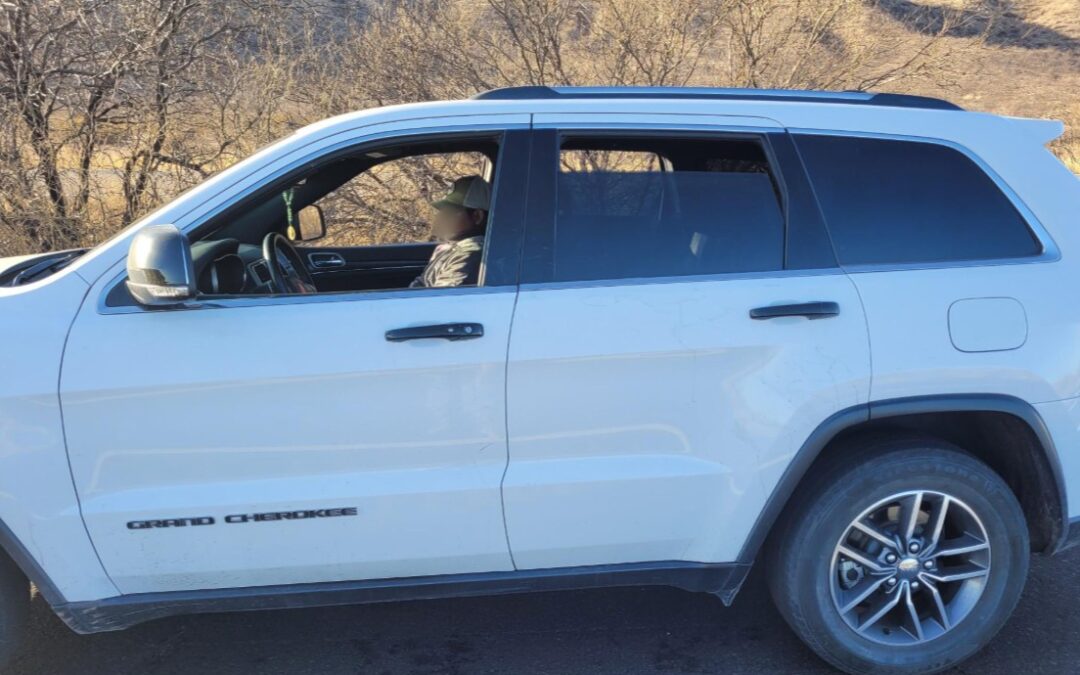
by Staff Reporter | Apr 13, 2025 | News
By Staff Reporter |
The Trump administration will no longer continue its legal challenge to Arizona’s documentary proof of citizenship (DPOC) laws.
The Department of Justice (DOJ) filed a brief on Tuesday motioning to drop the case.
Assistant Attorney General Harmeet Dhillon filed the brief the very day after she was sworn into her position within the Civil Rights Division, alongside the controversial Interim Attorney for the United States Attorney’s Office for the District of Arizona, Timothy Courchaine.
Senate President Warren Petersen called the development “a major win for election integrity and the rule of law” in a statement Wednesday. Petersen previously submitted a letter to the DOJ requesting they drop the case.
“The @azsenategop and @azhousegop will continue to defend this law against the special interest groups challenging it,” said Petersen.
Petersen submitted his request letter to Attorney General Pam Bondi in mid-February.
The case, Mi Familia Vota v. Fontes, is before the Ninth Circuit Court of Appeals.
Arizona’s DPOC laws required automatic rejection of Arizona state form registration submissions lacking DPOC, prohibited individuals who hadn’t provided DPOC from voting for a president or returning a ballot by mail, and added mandatory fields to the state registration form for a registrant’s birthplace and a checkbox confirmation of the applicant’s U.S. citizenship.
Last August, the Ninth Circuit Court of Appeals ruled Arizona would have to accept state voter registration forms without DPOC.
Tuesday’s motion by the DOJ was the latest in the Trump administration’s efforts to cease legal action against states’ election laws.
Last month, the DOJ dropped multiple election-related lawsuits in Texas, Georgia, and Louisiana initiated under the Biden administration. Those lawsuits opposed voting maps and election integrity initiatives, respectively.
President Donald Trump and his administration have also taken steps to require proof of citizenship in elections, prompting resistance from the state’s top Democratic leaders.
Arizona Secretary of State Adrian Fontes, alongside Attorney General Kris Mayes, filed a lawsuit against the Trump administration over President Donald Trump’s recent executive order requiring DPOC to register to vote in federal elections as well as requiring all ballots to be received by Election Day.
Last week, Mayes and Fontes held a joint press conference announcing their lawsuit and accusing Trump of “unconstitutional intrusion” on states’ rights and congressional authority regarding elections. The pair want Trump to go through — not around — Congress for any election law changes.
“If President Trump wanted to make laws then he should have run for congress where the U.S. Constitution says that work is done,” said Fontes. “If the President wants to reshape our elections, he must propose realistic bipartisan legislation in Congress instead of forcing states into unfunded mandates through unlawful executive orders.”
“Clearly, Trump only supports state’s rights when it suits him,” said Mayes.
Last month in another case pertaining to DPOC, the Arizona Court of Appeals ruled against the Elections Procedure Manual (EPM) produced by Secretary of State Adrian Fontes. Fontes’ EPM would have allowed voters who failed to submit or couldn’t achieve verification of their DPOC.
AZ Free News is your #1 source for Arizona news and politics. You can send us news tips using this link.

by Staff Reporter | Apr 10, 2025 | News
By Staff Reporter |
The Arizona legislature passed a bill recognizing the existence of only two genders and defining sex-based terms.
The Senate passed HB 2062 on Tuesday along party lines.
The bill from State Rep. Lisa Fink established definitions for the two genders and all related gendered terms: “boy” defined as “a human male who has not yet reached adulthood”; “father” defined as “a male parent of a child or children as defined by law”; “female” defined as “an individual who has, naturally had, will have, or would have, but for a developmental anomaly or accident, the reproductive system that at some point produces ova”; “girl” defined as “a human female who has not yet reached adulthood”; “male” defined as “an individual who has, naturally had, will have, or would have, but for a developmental anomaly or accident, the reproductive system that at some point produces sperm for fertilization of female ova”; “man” defined as “an adult human of the male sex”; and “mother” defined as “a female parent of a child or children as defined by law.”
HB 2062 also defined “sex” to mean “a person’s biological sex, either male or female, at birth.”
Governor Katie Hobbs is unlikely to approve this bill. She vetoed similar legislation last year (SB 1628), writing in a brief explanation letter that she would not harm residents of the state.
“As I have said time and again, I will not sign legislation that attacks Arizonans,” wrote Hobbs.
Hobbs has declared that individuals become the gender they believe they are, as opposed to their biological sex.
The Independent Women’s Network (IWN) — a grassroots activist group heavily involved in preserving sports participation based on biological sex — launched a campaign to urge Hobbs to go back on her past stances on transgenderism and sign HB2062 into law. One of IWN’s most prominent ambassadors is Riley Barker (nee Gaines), the collegiate swimmer turned political activist after losing to Lia Thomas, a male swimmer who identifies as a female.
“Call upon Governor Hobbs to sign this common sense, pro-woman measure into law to prevent sex discrimination in Arizona,” stated IWN. “We cannot fight sex discrimination if we cannot define ‘sex.’”
Senate Democrats argued for the reality of transgenderism. State Sen. Analise Ortiz said that males who believe they are females should be viewed as such.
“This should terrify us because trans women and girls are already a vulnerable population and this would only make them more vulnerable,” said Ortiz. “The explicit goal is to erase trans people from public life, including causing them to lose their jobs. It is wrong. We just need to respect people for who they are.”
The bill passed out of the House in February, where it also passed along party lines.
State Rep. Stephanie Simacek called the reality of gender “narrow and outdated.”
State Rep. Lorena Austin cited “her lived experience” as a “nonbinary” and “gender nonconforming” to argue against the bill. Austin claimed Christians had no right to determine what constituted gender in the law.
AZ Free News is your #1 source for Arizona news and politics. You can send us news tips using this link.

by Staff Reporter | Apr 10, 2025 | News
By Staff Reporter |
The Environmental Protection Agency (EPA) will no longer penalize Arizona and other states for foreign air pollution affecting state levels.
The EPA decision follows local and statewide efforts by Arizona’s elected and grassroots leaders in recent years to toss this regulation.
Among those engaging with the EPA was the Arizona Free Enterprise Club (AFEC). The grassroots organization’s president, Scot Mussi, commended the EPA decision.
“Due to this regulation from the Biden Administration, Arizona was being forced to adopt radical control measures, like banning gasoline-powered vehicles, which still would have left our state short of meeting the ozone standard,” said Mussi. “Yet again, the left’s environmental policies have proven to be disastrous and unworkable. For the good of our state and country, we must never repeat these mandates.”
EPA Administrator Lee Zeldin announced on Monday it would rescind the Guidance on the Preparation of Clean Air Act Section (CAA) 179B Demonstrations for Nonattainment Areas Affected by International Transport of Emissions.
The EPA published a press release, also on Monday, detailing the changes to air pollution regulations. The rescinded guidance effectively penalized states for air pollution caused by other countries.
“This guidance made it unnecessarily difficult for states to demonstrate that foreign air pollution is harming Americans within their borders,” stated the EPA. “States should not be penalized for air pollution beyond their control, including pollution crossing international borders into the United States.”
In a statement, Zeldin said U.S. citizens shouldn’t be held responsible for other nations’ air pollution failures.
“Americans should not be harmed by other countries that do not have the same environmental standards we have in the United States,” said Zeldin. “Not only are we eliminating cumbersome red tape that placed an excessive burden on states to prove emissions were from an international source, but we are also helping states across our nation prosper while ensuring they continue to provide clean air for their residents.”
The EPA said it would work with state and local air agencies to secure regulatory relief under the rescinded guidance.
The guidance emerged in December 2020 during the last month of the first Trump administration. The guidance was intended to assist state, local, and tribal air agencies with developing a demonstration on how a nonattainment area would be able to attain or would have attained relevant National Ambient Air Quality Standard if not for other countries’ air pollution.
Last month, the EPA agreed to reconsider its determination that the Northern Wasatch Front in Utah failed to attain the 2015 Ozone National Ambient Air Quality Standards.
This latest policy change aligns with the Trump administration’s designs for the EPA under Zeldin outlined in his Powering the Great American Comeback initiative. Zeldin declared in his announcement of the initiative that conservation was inherently a core principle of conservatism.
This initiative announced in February proposes five new pillars of guidance for the EPA’s work over the first 100 days and throughout the next four years, all centered around American independence and dominance: securing clean air, land, and water for all Americans; restoring American energy dominance; permitting reform, cooperative federalism, and cross-agency partnership; making the U.S. the artificial intelligence capital of the world; and protecting and bringing back American auto jobs.
In a joint press release issued on Monday, Maricopa County Chairman Thomas Galvin and Supervisor Debbie Lesko said they made the case in a meeting last month with the EPA of the difficulty for states to prove certain air pollution impacts. The stance from current county leadership marks a departure from past leadership, which advanced measures to meet EPA compliance on ozone standards.
“At that meeting, county leadership demonstrated how difficult it has been for states like Arizona to prove the impact of air pollution from international transport, and as a result, we risk more regulation,” said Galvin and Lesko. “As Administrator Zeldin said, today’s announcement is a step in the right direction for states looking to balance the need for clean air with the importance of economic development.”
Galvin and Lesko also thanked Senator Mark Kelly for providing assistance on the issue.
AZ Free News is your #1 source for Arizona news and politics. You can send us news tips using this link.

by Staff Reporter | Apr 4, 2025 | News
By Staff Reporter |
An American citizen is in critical condition after evading Border Patrol agents while smuggling illegal aliens over the weekend.
Customs and Border Protection (CBP) detailed the incident in a Tuesday press release. Detection technology observed the unnamed citizen driving a “suspicious” white Nissan Rogue traveling northbound from the border near Parker Canyon Lake around Sonoita around 3 pm on Saturday. The pursuit leading to the crash began after field agents located the car driving on state Route 83.
The vehicle stopped briefly to allow three individuals to exit, where they ran into the surrounding high desert. The vehicle continued northbound to evade Border Patrol agents along the highway, driving further for about four miles before apparently losing control and rolling onto its side. The driver lost consciousness on impact and sustained critical injuries.
Agents arrested two Guatemalan illegal immigrants and one Mexican illegal immigrant following the crash. All face charges for illegal reentry into the country, while the incapacitated driver faces alien smuggling charges.
U.S. citizen involvement in illegal alien smuggling has continued even amid heightened border security and mass deportation efforts under the Trump administration. A key initiative concerned Mexico and Canada committing 20,000 total troops and personnel to the southern and northern borders, respectively, to stop illegal immigration and drug smuggling.
Border Patrol also recently teamed up with the Department of Defense to beef up border security.
Field agents apprehended other Americans smuggling seven illegal aliens on Tuesday, also in the Sonoita area. The illegal aliens faced illegal entry and illegal reentry charges.
Two vehicles driven by two American citizens were apprehended in Willcox earlier this week.
AZ Free News is your #1 source for Arizona news and politics. You can send us news tips using this link.

by Staff Reporter | Apr 3, 2025 | News
By Staff Reporter |
On Monday, Arizona lawmakers joined activists in hosting an anti-deportation discussion panel at South Mountain Community College.
The event, “Resisting Mass Deportation,” featured State Senator Catherine Miranda (D-LD11) and State Representative Brian Garcia (D-LD08) along with American Civil Liberties Union (ACLU) of Arizona executive director Victoria Lopez, Living United for Change in Arizona (LUCHA) Arizona members, and Arizona Luminaria staff writer John Washington (also the author of the books “The Dispossessed: A Story of Asylum at the US-Mexico Border and Beyond” and “The Case for Open Borders”).
The ACLU of Arizona and LUCHA Arizona arranged the panel.
“Trump’s mass deportation agenda has oversaturated the news. His administration is pushing the moral and legal bounds of our country to expedite deportations, disregarding people’s rights and humanity in the process,” read the ACLU event page. “At the same time, the Arizona state legislature is advancing several bills that would force our state to do the anti-immigrant bidding of the federal government, use state resources to fuel the mass deportation machine, incentivize police to prioritize immigration enforcement over public safety, and more.”
A press release from the ACLU described the panel as a means of organizing “to take direct action to stop anti-immigrant legislation advancing in the state legislature.”
One such bill of concern for the anti-deportation faction is SB1164, the “Arizona ICE Act.”
The Arizona ICE Act would enable officials or agencies of Arizona or a county, city, town, or other political subdivision to enter into agreements with any federal agency for the purpose of enforcing federal immigration laws. The legislation would also prohibit officials or agencies of Arizona as well as counties, cities, towns, or other political subdivisions from establishing, adopting, or enforcing “any policy, pattern, or practice” that hinders cooperation with federal immigration authorities in immigration enforcement. SB1164 also allowed local governments to access federal resources and state agencies to issue grants for purposes of immigration enforcement.
The House Government Committee passed the Arizona ICE Act last week.
Miranda, who co-chairs the Latino Legislative Caucus, spoke out against the bill recently. She claimed the bill would only “worsen public safety.” Miranda expressed confidence in Governor Katie Hobbs’ intent to veto the bill.
“Arizona knows from experience that encouraging local agencies to engage in federal immigration enforcement will lead to racial profiling and discrimination, particularly against Hispanic, Latino, and other immigrant communities,” said Miranda.
Hobbs’ lack of support for the bill would conflict with her recent pledge last month to secure the border and reduce illegal immigration. Hobbs issued an executive order reminiscent of her predecessor, Doug Ducey, which directed the Arizona Department of Public Safety and Arizona Department of Homeland Security to create a joint task force, Operation Desert Guardian, to expand border security. The task force partners with the federal government and local law enforcement to stop transnational crime organizations within the border counties.
Under the Trump administration, border encounters dropped by over 90 percent and drug smuggling has slowed tremendously. Cochise County Sheriff Mark Dannels confirmed as such in a recent interview with KTAR News.
“Whether you like Trump or not, it’s irrelevant. It’s working,” said Dannels.
AZ Free News is your #1 source for Arizona news and politics. You can send us news tips using this link.





